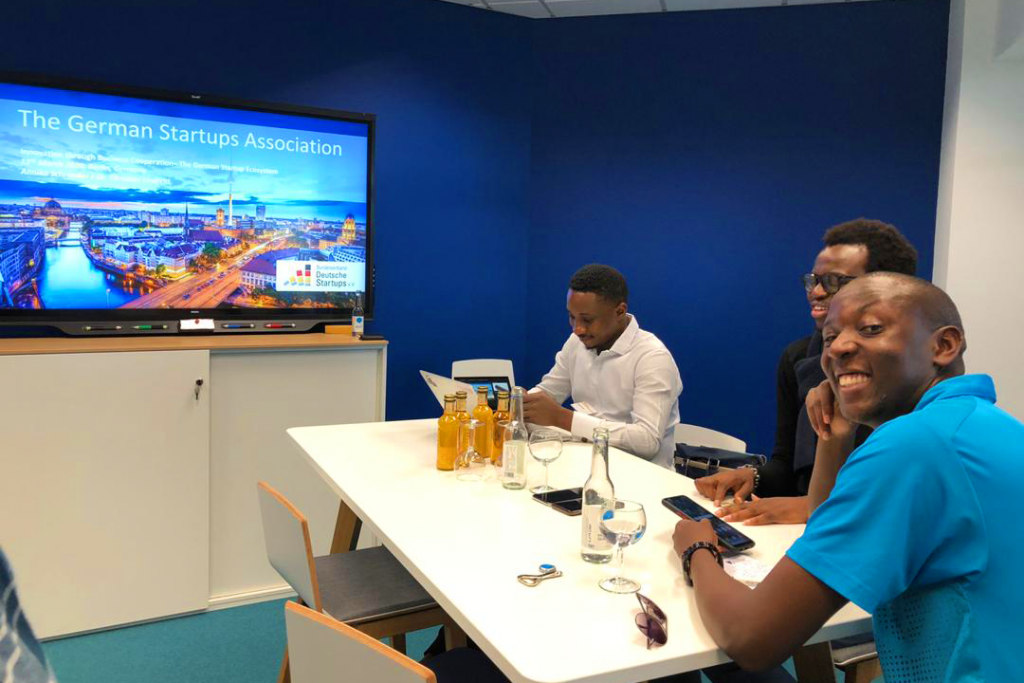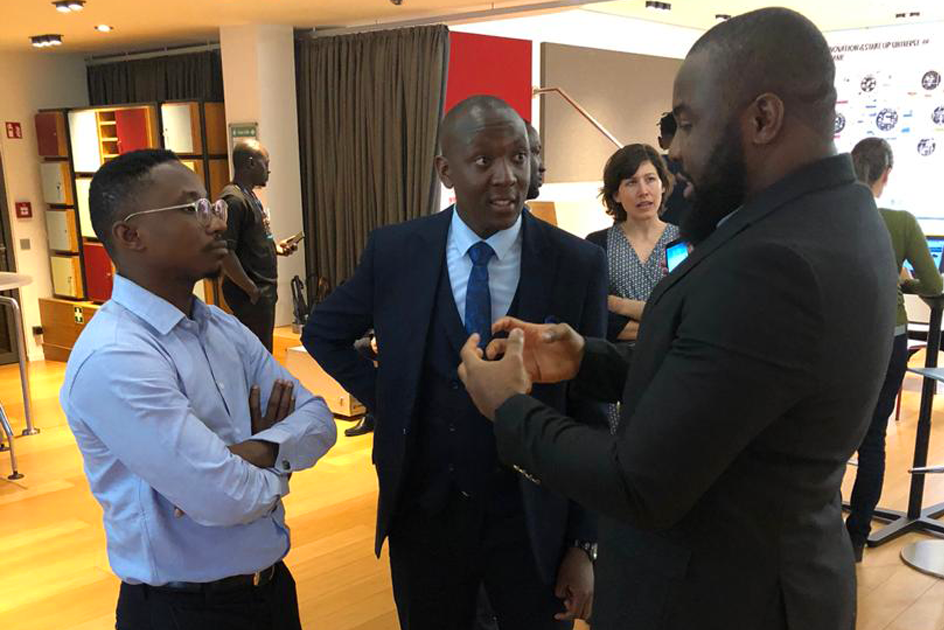Last week, I was in the German cities of Berlin and Dresden interacting with innovators, incubation hubs, accelerators, professionals, policy makers, corporate entities and private sector bodies such as the German-Africa Business Association, the Mittelstand Alliance Africa and the German Startups Association. The visit and dialogues were coordinated by the Konrad Adenauer Stiftung, a German political party foundation affiliated with but independent of the ruling Christian Democratic Union (CDU).

Like most startup ecosystems in the world, the German innovation landscape is mostly comprised of young people, either working on their own innovations or hired by corporate innovation departments such as the Deutsche Bank Innovation Lab in Berlin, Airbus, Audi, and the Volkswagen Future Mobility Incubator in Dresden, the capital of the eastern German state of Saxony.
Aptly termed as the “new economy” by Mr. Marc Biadacz- a Member of Parliament on the Digital Agenda Committee of the Bundestag (German federal Parliament), the German digital ecosystem contrasts with the “old economy”, which is mainly comprised of predominantly family-owned small and medium-sized enterprises. According to Family Capital, in 2019, Germany’s top 500 family businesses contributed nearly 43% of the economy’s GDP and contributed about 13% of jobs in the domestic market.
From the German Startup Association’s perspective, a startup is a highly innovative business younger than ten years, with a technology and/or intellectual property based business model. It should have a significant employee and/or revenue growth, however, all these fundamentals do not have to be necessarily present for a venture to qualify as a startup. The ecosystem pursues a more integrated approach in terms of shared networks, financing, market and cooperation, soft-landing opportunities (accommodation, research grants offices and innovation centres paid for by government agencies such as the Dresden office of economic development), internationalization and scale up.
It is important to note that whereas Germany’s digital innovation ecosystem is still in infancy like Uganda’s, it is underpinned by a more robust and developed industrial economy. Access to financing is easier, and the ecosystem is highly interlinked to a wider European Union (EU) framework that guarantees easy scaling opportunities and attracts talent and ventures from other well-established ecosystems such as the United Kingdom, Estonia, India, China and the United States of America. There is also much more focus in complementary approaches taken by respective cities in terms of their strength and industry. For instance, Berlin is mostly a “software hub”, Dresden has strength in hardware, and Frankfurt is taking the lead in fintech innovations.
On the other hand, the Ugandan ecosystem is developing in a highly fragmented and informal economy, with significant market entry gridlocks such as lack of a harmonized regulatory framework in terms of entry and access to East African (regional) and African (continental) markets, thus making it harder to scale due to limited traction in a highly “Kampala-centric” economy.
Furthermore, local financing in terms of early-stage venture capital and private equity still remains scarce and is mostly tied to brick and mortar assets such as real estate and livestock. Corporate Research and Development budgets largely remain in-house for most multinational firms that dominate the formal economy and are coordinated at group level in key business headquarters such as London and Johannesburg. This negatively impacts value co-creation, prototyping, market development and formation of potential synergies, partnerships and collaborations between corporates and start-ups.
Another fundamental strength is that the German innovation ecosystem is powered by a very strong and practical education system in natural sciences, physics, engineering, biotechnology and mathematics. Historically, the universities openly collaborate with the private sector and emerging entrepreneurs as trial, testing and launch sites. The regulatory framework is reviewed regularly, but there are still challenges with the pace of decision-making in Berlin due to a highly bureaucratic Federal system of governance. However, the industry associations are heavily involved in the consultation and feedback processes prior, during and after enactment of laws and regulations affecting the ecosystem.
Furthermore, Germany has set out to enhance top talent attraction by enacting the Skilled Immigration Act, 2020. With effect from 1st March 2020, skilled workers from non-EU states with tertiary or vocational qualifications can freely relocate and work in Germany upon being accredited. Such a move is intended to close the skills gap and create more diversity of perspective and inclusion in the ecosystem.
In terms of challenges, gender inclusion of female entrepreneurs remains high on the agenda. It is estimated that female founders comprise of only about 15.7% on the entire startup ecosystem in Germany. Efforts put in place to increase more female participation include the “Female Founders Monitor” through sharing more female success stories, enhanced support structures, and female founder networks. In comparison with Uganda, the MasterCard Index of Women Entrepreneurs listed Uganda as having a 34.8% of women entrepreneurs in 2017. However, most female-led ventures are small businesses with little opportunities for growth and scale.

Another challenge is that traditionally, the German ecosystem has not paid keen attention to doing business in Africa and with African startups. This has created very few growth and cross-border opportunities between German and African ventures, yet massive partnership and collaboration opportunities exist in key digital frontiers such as fintech, clean energy solutions, meditech, transport and mobility, edutech, agritech, and other fields.
It is hoped that the creation of the Africa Corridor within the German Startups Association will act as a significant cross-link catalyst between the German and African startup ecosystems. Internally, the Ugandan ecosystem has to map out a plan on how to leverage our regional and continental networks to harness such cross-border engagement opportunities through avenues such as Business Process Outsourcing (BPOs), exchange programs, and joint product development initiatives.
By and large, according to Partech’s 2019 Africa Tech Venture Capital Report, the Ugandan ecosystem is quietly growing within the East Africa space. Recorded deal value was USD 38 Million spread across 4 deals. Major challenges such as infrastructural and market barriers to building investible ventures, access to financing, entrepreneurial skills gap and limited exit options due to illiquid and immature capital markets for Initial Public Offerings (IPOs) remain.
On the other hand, the German ecosystem is one of Europe’s leading powerhouses characterized by high levels of funding activity and successful exits in IPO and M&A deals. It attracted about USD 4.8 Billion in VC funding in 2019, nearly double four years ago according to European startup ecosystem newsletter, Sifted. It therefore offers some important lessons and experiences that can help us to leapfrog the growth factors of the Ugandan ecosystem. With the recent global shocks arising from COVID-19, it remains to be seen how the respective ecosystems will perform in 2020.
Next week, I will share insights from my visit to the Volkswagen Future Mobility Incubator in Dresden and lessons we can learn from their corporate innovation model.







 As a dual-trained Ugandan and South African lawyer, my focus is on assisting businesses, innovators and investors in shaping the trajectory of the Fourth Industrial Revolution (4IR) on the African continent, by deploying the skills, knowledge and experience accrued over time.
As a dual-trained Ugandan and South African lawyer, my focus is on assisting businesses, innovators and investors in shaping the trajectory of the Fourth Industrial Revolution (4IR) on the African continent, by deploying the skills, knowledge and experience accrued over time.